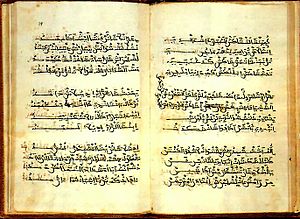Poema de Yuçuf facts for kids
The Poema de Yuçuf (which means "Poem of Joseph") is an old poem. Nobody knows who wrote it. It was written in the Aragonese language using Aljamiado script. This means it was written in Spanish but with Arabic letters. It comes from the 1300s.
The poem uses a special rhyming style called "cuaderna vía." A Morisco poet wrote it. Moriscos were Muslims who stayed in Spain after Christians took over. The poem is not complete, but about 380 lines still exist today.
About the Poem
The poem exists in two old books, called codices. Manuscript B is the most complete one. A scholar named Ramón Menéndez Pidal said it was written in Aragonese that sounded very Spanish. Manuscript A, however, uses more typical Aragonese sounds and words.
Menéndez Pidal believed the poem was written around the mid-1300s. It was likely meant for Mudéjar people. Mudéjars were Muslims who lived in Christian areas of Spain.
The Story of Joseph
This poem tells the story of Joseph. He was one of the twelve sons of Jacob. But it doesn't follow the story exactly as it is in the Christian Bible. Instead, it tells the story based on Islamic traditions.
The poem is like a detailed look at the story of Joseph from the Qur'an. It also uses ideas from other old stories. These include the Golden Legend and the Sēfer ha-Yāšār, which are collections of legends.
Joseph's Adventures
The poem begins with Joseph (Yuçuf) and how his brothers became jealous of him. They treated him badly and left him alone. Yuçuf was then sold as a slave. He was taken to Egypt.
In Egypt, a woman named Zalifa, who was the wife of Potiphar, taught him many things. She and her friends fell in love with Yuçuf. They admired him because he could do amazing things and predict the future.
Joseph's brothers and father thought he was dead. But a wolf told Jacob that his favorite son was still alive. Yuçuf later ended up in prison. However, he could explain the dreams of the king's servants. This skill helped him gain his freedom.
The poem ends (in the more complete Manuscript B) with Joseph calling his brothers to Egypt. He then reveals himself to his younger brother, Benjamin, who loved Yuçuf very much. The other brothers return home, feeling ashamed of what they had done.
Poetic Style
According to Antonio Pérez Lasheras, the poem shows the poet's strong feelings. He points out parts that are very emotional. This is impressive because the poet had to stick to a story that was already well-known.
For example, when Joseph is beaten by his brothers, he cries out (verse 17):
|
Non querás que finque sin padre y sin madre, |
You would not want me to be left without father and without mother, |
Later, there is a beautiful description of the land and surroundings (verse 59):
|
Cuando entroron por la villa, las gentes se maravellaban; |
When they entered the town, the people marveled at them; |
Such descriptions of nature were not common in Spanish literature at that time. But they were more common in the Andalusian (southern Spanish) tradition.
See also
 In Spanish: Poema de Yuçuf para niños
In Spanish: Poema de Yuçuf para niños
 | Frances Mary Albrier |
 | Whitney Young |
 | Muhammad Ali |


